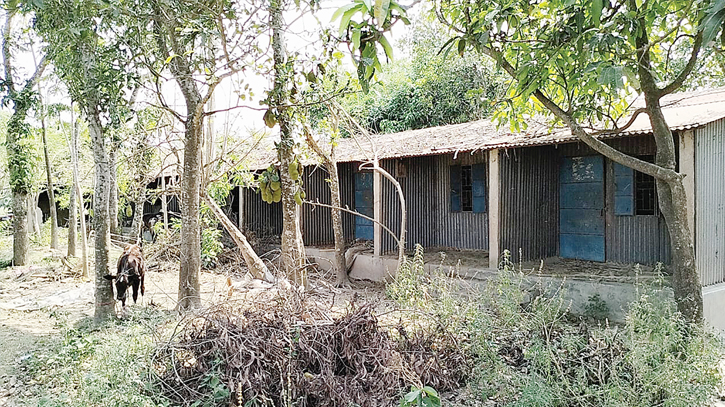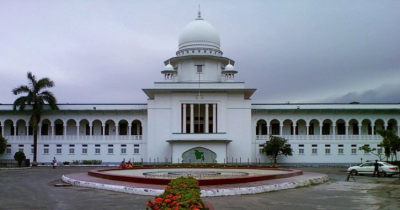
The Habaspur Asharyan Project in Kumarkhali of Kushtia has become a source of suffering for residents, with rusted walls causing leaks during rainfall, and essential facilities such as tube wells and toilets falling into disrepair. Photo: Messenger
The Habaspur Asharyan Project, a government housing initiative aimed at providing shelter to the landless poor in Kumarkhali Upazila, is now a shadow of its former self, plagued by neglect and a lack of maintenance. The once-promising settlement has turned into a source of suffering for those who remain, as tin canopies and walls have rusted, leading to leaks during rainfall, and essential facilities like tube wells and toilets have fallen into disrepair.
Out of the 120 houses in the project, a staggering 70 have been abandoned, with the rest barely habitable. The situation has driven 80 families to leave, yet 40 landless families continue to reside in these dilapidated structures, enduring inhumane living conditions. Cows and goats now occupy the abandoned houses, further highlighting the deterioration of the project.
The housing project was established approximately 20 years ago on the banks of the Garai river ( widely known as Madhumati River) in Habaspur village, under the supervision of the army. It was designed to rehabilitate the poor and landless, with each of the 12 barracks containing 10 rooms, intended for 120 families. However, years of neglect have taken their toll, leaving the residents in despair.
Zabeda Khatun, Rubela, Ashraful Islam, and Anwara Khatun, residents of the project, recounted the hardships they face. They described how fires caused by exploding electricity meters have destroyed houses, with no subsequent repairs or renovations. This has left many homes unusable, with only two of the original 12 tube wells still functioning, albeit poorly. The bathrooms have long been unusable, forcing residents to fetch water from afar and use the river for bathing.
"When it rains, water enters through the broken tin roofs, soaking our belongings and bedding," said Zabeda Khatun. "We are in constant distress. Many families have already left, but we have nowhere else to go. We need immediate renovations, new tubewells, and functioning bathrooms."
Visiting the site reveals a grim picture: 70 abandoned houses, overgrown with weeds, and the remaining houses rusted and damaged. Roads leading to the project are also in disrepair, exacerbating the residents' struggles.
Azad Sheikh, President of Habaspur Housing, emphasized the extent of the damage, stating that 30 houses have been burnt and abandoned, while the rest are in poor condition. Essential infrastructure like tube wells, toilets, and roads is in dire need of repair.
Rizia Khatun, a septuagenarian resident, poignantly described her living conditions as akin to a bird's, having to pack her belongings during rain to prevent them from getting wet. She appealed for speedy reforms, expressing the hope that government intervention could restore the project and provide comfort to the poor residents.
Efforts to reach Nandalalpur Union Parishad Chairman Ziaur Rahman Khokon and Union Parishad member Nayan Ali were unsuccessful. However, Kumarkhali Upazila Project Implementation Officer Saidur Rahman acknowledged the issues and mentioned that allotment applications have been made, which he believes will address the problems.
Kumarkhali Upazila Nirbahi Officer (UNO) SM Mikail Islam, when reached for comments, said he was in a meeting and could not speak at the time.
The plight of the Habaspur Asharyan Project serves as an unambiguous reminder of the challenges faced by similar initiatives when they are not sustained with proper care and attention. The residents' plea for renovation and the restoration of essential services is a call to action for local authorities to ensure that such projects fulfill their intended purpose of providing dignified shelter to the landless poor.
Messenger/Fameema








